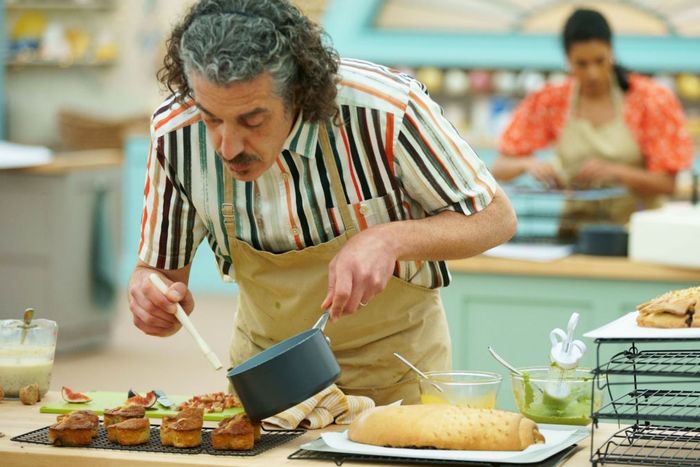
This post spoils the finale of The Great British Bake Off.
I come from a large family of British people and Americans who love them, and there are two subjects that bond us together like nothing else: Brexit and The Great British Bake Off. (We refuse to use the Pillsbury-mandated American alias.) A few weeks ago, my dad finally brought both of these obsessions together when he threw a grenade into the family group chat: Was this season of Bake Off a symbolic restaging of the 2016 Brexit referendum, a reassuring fantasy in which the outcome could be reversed? Now, if your group chats are anything like mine, you’ll know that ideas put forth there do not always stand up to scrutiny. But Dad made his case, I did some research, and I have to admit, I think he’s right.
Let’s start with an incontrovertible fact: This was a very English season of Bake Off. For the first time since 2011, there were no Scottish, Welsh, or Northern Irish bakers in the tent. Thus, unlike a typical season of Bake Off, its story was not about the constituent parts of the U.K. coming together to make a glorious whole. Instead, this would be a season about England, the former imperial heartland that led the charge for Leave, and its relationship to Europe and the rest of the world.
In place of the token Scottish or Welsh baker, the exotic color this season came courtesy of two contestants who loomed above the rest: the Italian Giuseppe and the German Jürgen. Both were products of a pre-Brexit age, Europeans who had made lives in England as adults, and they absolutely dominated the opening stretch, taking home five of the first seven Star Baker honors. Jürgen and Giuseppe were not just great bakers, they also made for great TV, each comfortably slotting into innocuous national stereotypes: Jürgen was rational and soft-spoken, a bit like a Teutonic teddy bear; Giuseppe was more animated, with wild curls and the world’s only flattering soul patch. Their beautiful, technically flawless bakes were the dream of the European Coal and Steel Community made flesh dough — two former wartime enemies seamlessly integrated into the most cozily British scenario imaginable. Even the incessant accent jokes from hosts Noel Fielding and Matt Lucas carried less of an edge than they might have in decades past. Here it felt like family banter, a vision of the U.K. still firmly knitted into the European fabric.
Which is not to say that the English bakers got short shrift. There was Lizzie, a colorful Liverpudlian whose Scouse gumption made her a fan favorite. Another standout, Freya from Yorkshire, was not just a glimpse of the future — she’s both Gen Z and a vegan — but also the past: In name and hairstyle, she was a spectral reanimation of the Northeast’s thousand-year-old history as the Viking colony of Jórvík. Contrast them to Maggie, this season’s token Little Englander, an archetype that usually does well on Bake Off. But not this time. While Maggie was pitched as a doppelgänger for judge Prue Leith — yes, the same Prue whose son is a pro-Brexit MP — it was of course hard to avoid thinking of another figure from British political history. When she forgot to add the flour to her sticky toffee pudding, there was no alternative: The lady was not for (re)turning.
Here’s another incontrovertible fact: Four of the first five bakers eliminated came from constituencies that voted Leave in 2016, while the top seven were all from Remain cities. The native-born bakers who went the distance all hailed from a different Britain than the Brexit ideal, a multicultural nation of casual assimilation. The middle tier this year was supplied by London’s Greek community: cheery detective Amanda and burly Cypriot George, who provided a more realistic counterpoint to the characters in Stath Lets Flats. Another Londoner, Crystelle, probably would have won the whole thing were it not for an underbaked focaccia. She was competing not just on behalf of her loving Goan family, but also an entire cohort of millennial yuppies; the woman absolutely loved miso, tahini, and yuzu. (A Goldman analyst, Crystelle also represented global finance, the less-sympathetic segment of the Remain coalition.) And her fellow finalist Chigs rarely saw his own South Asian heritage mentioned. Instead, Chigs was portrayed as the quintessential Leicester man, right down to his love of pork pies.
Last week’s grand finale put a cap on all this. After Jürgen’s shocking elimination in the semis, the season came down to Giuseppe, Crystelle, and Chigs. And what were they tasked to bake in the Technical? Perfect spiral buns from Belgium, the home of the E.U. They looked delicious. Brussels isn’t all bad.
The season ended as most would have predicted it would, with a Giuseppe victory. But after the celebrations, there was also a bittersweet note: A chyron informed viewers that the proud winner had left England and returned home to Italy. The fantasy had finally been punctured. If Britain doesn’t have room for a guy like Giuseppe, what is the point?



